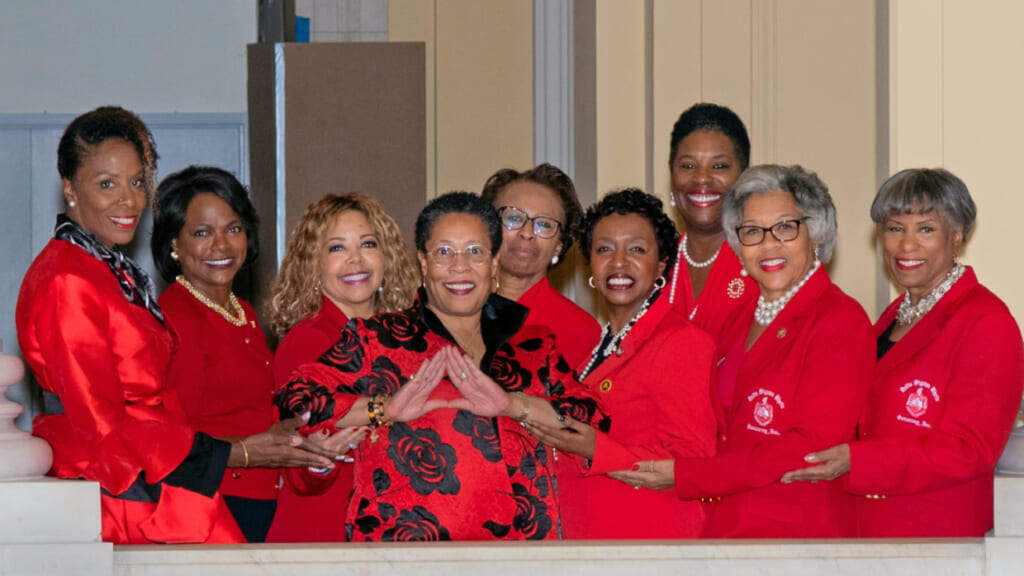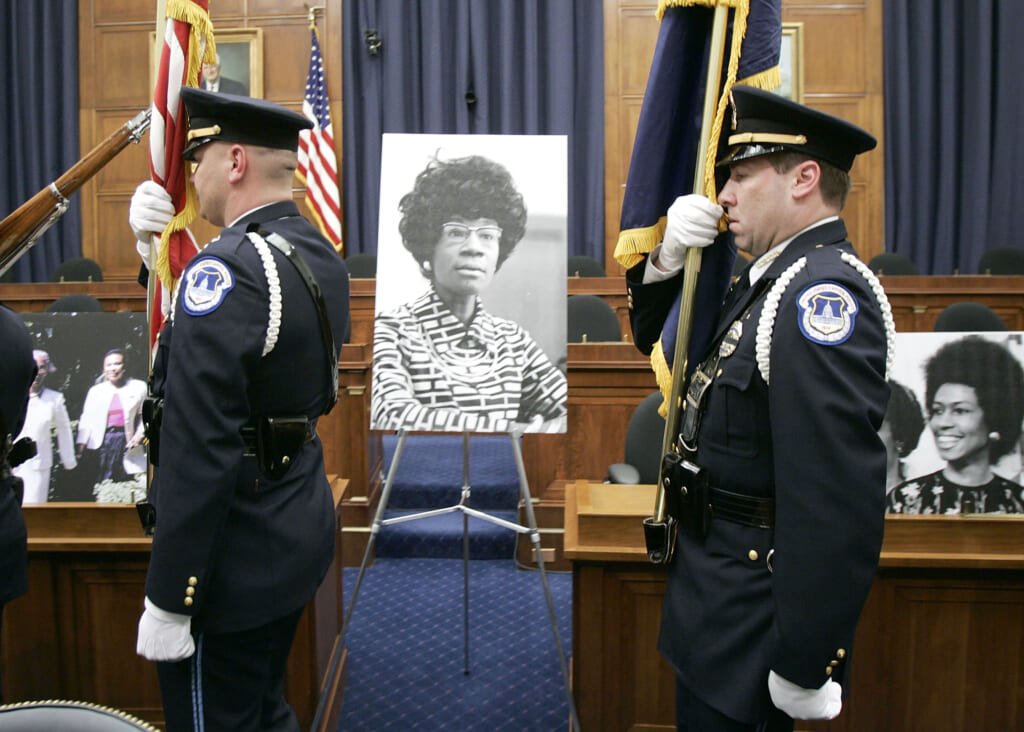Marcia Fudge’s HUD nomination is a win for Delta Sigma Theta Sorority, Inc.
OPINION: Rep. Fudge’s nomination continues the legacy of the sorority’s representation in electoral politics

Last week, President-elect Joe Biden formally nominated Representative Marcia L. Fudge (D-OH) to serve as the next U.S. Secretary of Housing and Urban Development. Congresswoman Fudge is a former national president of Delta Sigma Theta Sorority, Inc.
If confirmed, Fudge will follow in the footsteps of her sorority sister, Patricia Roberts Harris, as the second Black woman to lead this department. As a steadfast member of Delta Sigma Theta Sorority, Inc., Rep. Fudge first brought greetings to her sorority sisters at the onset of her remarks from Wilmington, Del., when she accepted Biden’s nomination.
Read More: Alpha Kappa Alpha and Delta Sigma Theta judges unite to bust up the prison pipeline
This rhetorical maneuver was more than an acknowledgment of her beloved sorority; it was a signal that Rep. Fudge would bring the sorority’s ideals with her into her new role as HUD secretary. She also reminded the nation of the important role that Black women — particularly Deltas — have played and continue to play in American politics.

Delta Sigma Theta Sorority, Inc. is an organization of Black college-educated women who are committed to public service in Black communities. Founded on the campus of Howard University in 1913 by 22 collegiate women, the sorority has deep roots in political action. The first public action of the newly formed sorority took place on March 3, 1913, the day before Woodrow Wilson’s presidential inauguration.
The 1913 Woman Suffrage Procession was organized by the National American Woman Suffrage Association and was designed to call attention to women’s exclusion from the democratic process. Members of Delta Sigma Theta, including Mary Church Terrell, marched in the segregated procession to call for women’s enfranchisement. As heirs to the political action legacy put forth their founders over 100 years ago, Deltas are highly politically active citizens who leverage their organizational ties to promote race/gendered based civic engagement.
Read More: After losing siblings to police violence, women join forces in Sisters Of The Movement
Of the 22 Black women who currently serve in the 116th Congress, there are seven Deltas, including Rep. Marcia L. Fudge. These members of Delta Sigma Theta Sorority, Inc. undoubtedly refined and honed their civic and political skills in this sisterhood that places a premium on political action.

Membership in a sorority, as well as other Black institutions such as the Black Church and historically Black colleges and universities (HBCUs), provide the necessary space for Black Americans to acquire political knowledge, develop social capital and tap into resources for political participation. They also cultivate political interests, demonstrate democratic norms, assist in political mobilization, and offer leadership opportunities for its members.
Therefore, it’s unsurprising that so many Black political leaders have formal ties to these institutions. For Black women, however, sorority membership often provides these benefits within supportive spaces that diminish the hold of racism, white supremacy, sexism and patriarchy.
As co-chair of Delta Sigma Theta Sorority, Inc. National Social Action Commission from 2000-2004, Rep. Fudge helped to set the sorority’s agenda and members’ involvement in advancing Black women’s policy preferences. Indeed, members of the sorority have championed Black women’s political interests since the sorority’s founding.
Read More: Almost 90 percent of Black women voters in Georgia likely to vote in runoff
Notable political Deltas include: Rep. Shirley Chisholm (D-NY), Frankie M. Freeman, Alexis Herman, Barbara Jordan (D-TX), Carrie P. Meek (D-FL), Dorothy I. Height, Barbara Watson, and Stephanie Tubbs Jones (D-OH). These women all helped to foreground Black women’s voices in key political decisions and policy deliberations. Rep. Marcia L. Fudge draws from her sorority sisters’ legacies to add her own contributions to advancing the interest of Black women through electoral politics.

When confirmed, Marcia Fudge will unwaveringly advocate for marginalized people who need a strong voice in the federal government. Throughout her political career she has fought for communities of color, women, children and low-income Americans. As HUD secretary, Marcia Fudge will bring a deep understanding of how and why some Black women rely on governmental services such as public housing. Critics of Black Greek Letter Organizations claim that they are elitist and further serve to divide Black communities around socio-economic lines.
However, Rep. Fudge’s ties to Delta Sigma Theta Sorority, Inc. position her to be an ideal HUD secretary. Because she played such an integral part of the sorority’s modern political history, Rep. Fudge has sustained communication and access to Black women who come from varied backgrounds. Deltas are not monolithic and although they share a common bond as college-educated women, they have varying life experiences and backgrounds.
Rep. Fudge’s history as the mayor of Warrensville Heights, OH, as well as her leadership roles with the Congressional Black Caucus and Delta Sigma Theta Sorority, Inc. have aided in her ability to effectively represent others. Her laser focus on challenging inequality, calling out racism and racists, and advancing the interest of Black women and girls are hallmarks of her political brand.
These qualities and policy positions are what made Rep. Fudge an ideal cabinet pick for the Biden-Harris administration. Furthermore, she’s a power-player within the Democratic Party. Congresswoman Fudge publicly reminded the incoming administration that Black women helped to elect them and deserved representation in key government positions.

She previously angled for the Agriculture Secretary, given her work to combat food insecurities for urban residents. Although she was not selected for this position, Fudge’s nomination as HUD secretary is a win for Black women who deserve to see themselves and their interests reflected in the administration’s leadership team.
Rep. Marcia Fudge’s nomination continues the legacy of the sorority’s representation in electoral politics. But additionally, she carries with her a highly politically engaged constituency within her sisterhood. Delta Sigma Theta Sorority, Inc. reminded its members of the importance of voting and recently created D4Women in Action to endorse candidates for the 2020 election — including Kamala Harris and Joe Biden.
The power of Historically Black Universities and Colleges and Black Greek Letter Organizations have been highlighted this election cycle. For some, this is an opportunity to learn about the continued salience of these Black institutions. Showcasing the electoral power of these groups and by selecting leaders from these communities, Biden-Harris are centering women like Rep. Marcia Fudge who have meaningful ties to a key voting bloc.
Fudge is a central figure within Delta Sigma Theta Sorority, Inc., a stalwart Democrat from a key state, who is an effective and influential legislator, and an advocate for marginalized communities. Therefore, it is unsurprising that she was tapped for this cabinet position.
As a member of Delta Sigma Theta Sorority, Inc., I am proudly looking forward to her new role which will advance the policy interests of Black women within the Biden-Harris Administration.

Nadia E. Brown is an associate professor and University Faculty Scholar of political science and African American studies at Purdue University. Professor Brown is the author of the award-winning Sisters in the Statehouse: Black women and Legislative Decision Making. And the lead editor of Politics, Groups and Identities.
Have you subscribed to theGrio’s podcast “Dear Culture”? Download our newest episodes now!
TheGrio is now on Apple TV, Amazon Fire, and Roku. Download theGrio today!
